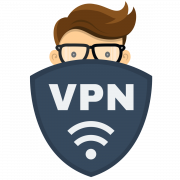
What is VPN?
Before we start digging deeper, let’s find out what VPN is. A virtual private network is a technology that creates a virtual tunnel for data exchange between the Internet user and the websites/portals he or she visits and protects the information passed through it. It is used to encrypt the assets and decrypt them on user’s device: thanks to such approach no third party can access the data sent (neither ISP nor government). Besides, VPN privacy is another reason to order the service. It hides user’s IP address and makes the network think he is located in a completely different spot: that allows visiting websites that are blocked in some certain regions. For example, users from the UK can watch Netflix streams from US servers using a VPN that connects them to American servers.
How to ensure excellent VPN privacy?
Although some users activate VPN for privacy only, they don’t know that free services and some extensions are not as secure as they seem. For example, browser in-built VPNs can actually show user’s location, and some software compromises users’ data. Some free software options can gather your data and use it for targeted ads. Therefore, it’s highly recommended to order paid services.
What is the best VPN for privacy? There are more than 400 players on the market of VPN, and the choice can be challenging. If you need true internet privacy, VPN services from this list are exactly what you need:
- NordVPN;
- VyprVPN;
- Express VPN;
- IP Vanish;
- TunnelBear.
7 Crucial Factors for Making an Informed Decision
If you need unbeatable privacy VPN should be chosen with consideration of several crucial aspects. Here is what you should pay attention to when picking up a suitable VPN option:
- The number of server locations. If you plan to access websites hosted in geographically spread servers (e.g. websites in different countries), you need a wide choice of servers. Check the list of provided servers – every company should have it published on the website.
- Client software. Most likely, if you opt for a paid solution, you’ll need to create an account and install a VPN client on your device. Find out the information about VPN software and define whether it’s user-friendly. Besides, some products are tailored for certain devices only, and if you want to buy a VPN package for connection on your smartphone and PC, make sure the service is compatible with all of them.
- A perfect privacy VPN should feature a dedicated and dynamic IP: it means your location will be really hidden, and the network will effectively hide your true IP so that it stayed unnoticed by third parties.
- Bandwidth caps. As a rule, VPN packages come with monthly bandwidth limits – if you exceed them, you will be disconnected without notification, or charged for extra traffic. Evaluate your needs and select a suitable package for VPN privacy without overpaying.
- Customer support. It’s especially important, if you’re a beginner, and won’t be able to set up Internet privacy VPN. Prior to ordering service, contact the company’s assistants. Check which communication channels are available, for instance, email, phone calls, or tickets: ideally, you should get a response within an hour and have different ways of contacting the client support.
- Remember that we get what we pay for. If you need a perfect privacy VPN, be ready to pay at least $10 per month. Want a VPN just to get access to blocked websites? Then you don’t need extra features, and can easily find a reliable solution with $5 monthly fee, or even lower.
- This is what all VPNs boil down to. Make sure that the service you’ve selected does ensure 100% privacy and data protection. Read users’ reviews on forums and, if you’ve already made an order, check how the network hides your IP address.
Note that while server location matters a lot, you should also pay attention to the number of protocols available. PPTP is the quickest protocol, but it works a bit slower. Make sure that the provider offers several protocols, and you can easily switch between them.
How to check whether VPN really works?
 Did you know that it’s enough to use a few lines of code to break down Internet privacy (VPN can reveal your genuine location)? Recently, Chrome and Firefox have leveraged WebRTC technology that fetches user’s request results and obtain the IP address in javascript. The requests cannot be blocked by AdBlockPlus and other similar plugins, which makes your personal information vulnerable.
Did you know that it’s enough to use a few lines of code to break down Internet privacy (VPN can reveal your genuine location)? Recently, Chrome and Firefox have leveraged WebRTC technology that fetches user’s request results and obtain the IP address in javascript. The requests cannot be blocked by AdBlockPlus and other similar plugins, which makes your personal information vulnerable.
It’s crucial to check whether your VPN service really works! That’s how to do it:
- Open a website like What Is My IP Address and check your actual IP address provided by the ISP.
- Log in to the VPN, select a server in another country and make sure you’ve connected.
- Go back to What Is My IP Address and check it one more time – the IP address should change and correspond with the country you’ve selected.
- Alternatively, you can check the IP in Roseler’s WebRTC test page
If both services display your VPN’s IP address, things are working correctly. Otherwise, your browser leaks your real ISP’s IP address.
Extra Features
What is the best VPN for privacy? The one that has all features you need. Advanced users need more than just another server at their disposal: in fact, VPNs can provide so much more! When choosing an option, pay attention to the following aspects:
- Compatibility with devices.
- No traffic limits (yes, some companies offer unlimited bandwidth).
- Configurable port-forwarding.
- Intuitive client software.
- The absence of log-files.
- IPv6 support.
- SSH and proxies.
- Advanced Routing.
With the help of a perfect privacy VPN, you can access almost any website you want, and this technology is crucial for preserving anonymity and securing your data. As soon as you understand how to install and activate the service, you will have no problems with protection of your sensitive data.

